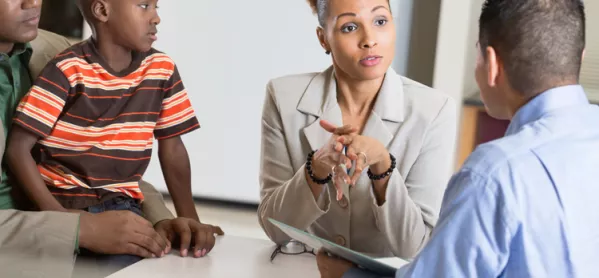
- Home
- ‘School readiness begins with parents’
‘School readiness begins with parents’

The Independent Review on Poverty and Life Chances in 2010 stated: “We have found overwhelming evidence that children’s life chances are most heavily predicated on their development in the first five years of life.”
The current consensus on the importance of early years is so strong that newcomers to the world of education may be surprised to hear that not too long ago it had a relatively low profile, with the perception being that it was mainly about childcare rather than education.
The myriad reports of children turning up to Reception unable to speak in sentences, still wearing nappies or being unresponsive to their own name would be depressing enough on their own.
However, we also know that if a child enters primary school behind their peers in developmental terms, she or he is likely to remain so for the duration of their schooling. Alex Quigley, of Huntington Research School, writes in Closing the Vocabulary Gap: “There is a huge amount of evidence to prove that the vocabulary gap begins early, before children even attend school. It then typically widens throughout their time at school, too often hardening into failure at GCSE level and beyond for word-poor children.”
So schools are rightly alarmed by such stories and have an interest in improving pre-school provision. Some secondary heads in the North East are saying that this is the most important area to focus on, even if it won’t benefit their own schools for another decade. But what is school readiness, what should we be doing about it and who should be doing it?
There is no official definition of school readiness, though many school leaders’ expectations roughly follow the Early Years Foundation Stage (EYFS) outcomes. In her speech to the Pre-School Learning Alliance conference earlier this month, Amanda Spielman gave a reasonably rounded view, encompassing language skills, basic hygiene and physical development. You might also add social skills – the ability to get on with both adult authority figures and other children, knowing how to take turns, etc – and development of some measure of independence from their parents as important parts of a more comprehensive definition.
'School readiness is a class issue'
Educators need to equip children for their transition into school and, ultimately, into adulthood. Early years teachers often share a child's very first experiences of being separated from their parents, interacting with adults outside of their own family and socialising with large numbers of new children. They can introduce children to books, group activities, physical development and risk-taking within a safe environment to prepare them for school.
In my region of the North East, we have a very high number of early years providers who are rated as "good" or "outstanding" by Ofsted. Yet this doesn’t correlate to success when assessing children against the Early Years Foundation Stage Profile (EYFSP) or against outcomes at the end of compulsory education, where the North East lags behind the rest of the country. This suggests that either the quality of early years provision in the region has been overstated by Ofsted or that a large number of children are not receiving any early years education and are thus arriving at primary schools unprepared. The latter is certainly an issue in parts of the North East; in some closer knit deprived communities nursery provision is not seen as necessary due to nearby family and higher unemployment.
What I think this suggests is that responsibility for school readiness must begin not with early years settings, but with parents and carers. They are the child’s first and most important teachers and often the only ones they have from 0-2.
We know that school readiness is indisputably a class issue. There are very strong associations between a child’s social background and their readiness for school, as measured by scores on entry into Year 1. Children from disadvantaged backgrounds are more likely to lack skills in reading, communication and socialising and, therefore, be seen as unready for school. Ofsted’s report “Unseen children: access and achievement 20 years on” stressed that the most effective early years settings worked to break the cycle of intergenerational disadvantage by going out of their way to engage parents, especially those who had negative experiences themselves, and worked in partnership with other agencies to provide integrated, easy-to-navigate services to vulnerable parents.
School readiness is too important for either parents or educators to tackle alone. We need a greater focus in this area to discern adoptable and evidence-based practice to give children the crucial building blocks they will rely on for the rest of their lives.
Mike Parker is the director of Schools NorthEast
Register with Tes and you can read five free articles every month, plus you'll have access to our range of award-winning newsletters.
Keep reading for just £4.90 per month
You've reached your limit of free articles this month. Subscribe for £4.90 per month for three months and get:
- Unlimited access to all Tes magazine content
- Exclusive subscriber-only stories
- Award-winning email newsletters
You've reached your limit of free articles this month. Subscribe for £4.90 per month for three months and get:
- Unlimited access to all Tes magazine content
- Exclusive subscriber-only stories
- Award-winning email newsletters



